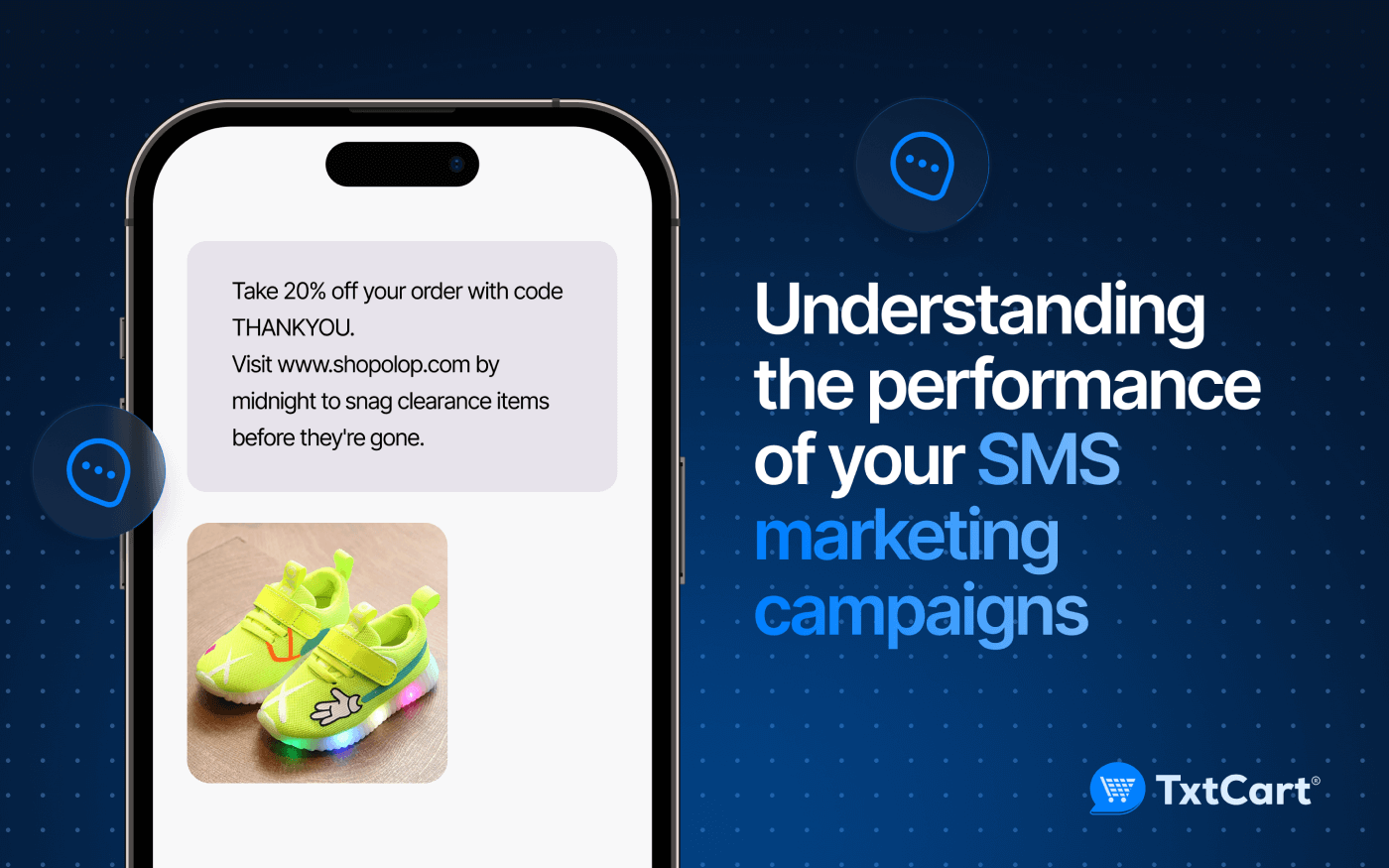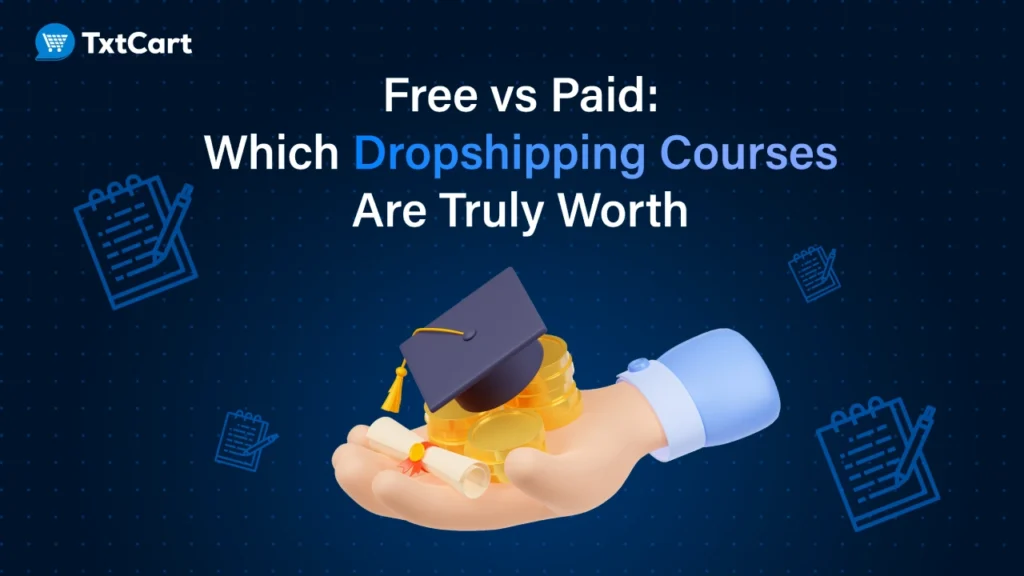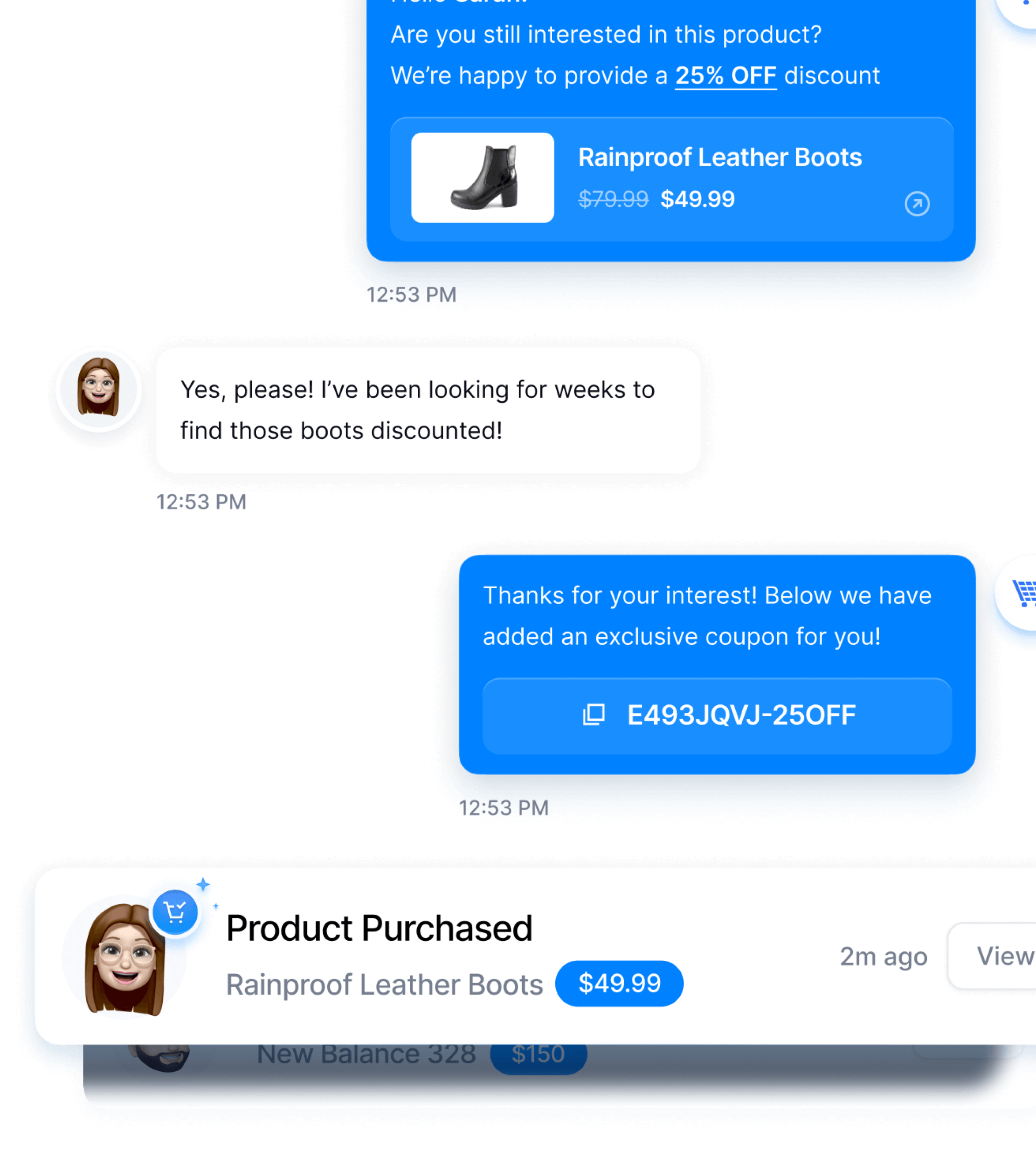You send out SMS, expecting sales to roll in—but how do you really know if your SMS marketing campaigns are working? Are they driving customer engagement, or are they just adding to your unsubscribe rate? Without tracking the right metrics, you’re flying blind.
Here’s what you’ll uncover in this guide:
- Key SMS marketing metrics: find out which numbers actually matter
- How to track success by measuring delivered messages, revenue, and opt-outs
- Ways to improve performance and optimize your SMS marketing strategy for better results
Let’s dive in!
TL;DR
- Delivery Rate – Measures how many SMS messages are successfully delivered.
- Open Rate – Indicates the percentage of delivered messages that are opened.
- Click-Through Rate (CTR) – Shows how many recipients clicked on a link in your SMS.
- Conversion Rate – Tracks how many recipients completed a desired action after receiving an SMS.
- Response Rate – Measures the percentage of recipients who reply to your messages.
- Opt-Out Rate – Identifies how many subscribers unsubscribe after receiving an SMS.
- Return on Investment (ROI) – Compares revenue generated to the cost of your SMS campaigns.
- List Growth Rate – Tracks how quickly your SMS subscriber list is expanding.
- Average Order Value (AOV) – Measures the average purchase amount from SMS-driven sales.
- Revenue Per Message – Calculates the revenue generated per SMS sent.
Key SMS Marketing Metrics You Should Track
Numbers don’t lie—but are you tracking the right ones? Before optimizing your SMS marketing strategy, you need to know which metrics actually matter.
The table below breaks down the key SMS marketing KPIs, how to measure them, and strategies to improve performance.
| Metric | What It Tells | How to Measure | Improvement Strategies |
|---|---|---|---|
| Delivery Rate | Percentage of SMS messages successfully delivered. | (Delivered messages ÷ Sent messages) × 100 | Regularly remove inactive numbers by filtering out contacts that haven’t engaged in the last 90 days. Verify new subscribers with a double opt-in (e.g., “Reply YES to confirm”). |
| Open Rate | Percentage of delivered messages that recipients open. | (Opened messages ÷ Delivered messages) × 100 | A/B test first-line variations (e.g., “Hey [Name], we’ve got a surprise!” vs. “Exclusive deal just for you!”). Optimize send times—3-6 PM is the best time to send SMS. |
| Click-Through Rate (CTR) | Percentage of recipients who click on a link in the SMS. | (Clicks ÷ Delivered messages) × 100 | Use a branded link shortener (e.g., Bit.ly) to keep URLs clean. Use urgency (e.g., “Offer Ends in 3 Hours!”). |
| Conversion Rate | Percentage of recipients who complete a desired action. | (Conversions ÷ Delivered messages) × 100 | Optimize your checkout page (enable auto-fill, offer express checkout, and minimize form fields) to reduce friction. Send follow-ups on viewed products, and recover abandoned carts with urgency-driven reminders |
| Response Rate | Percentage of recipients who reply to the SMS. | (Responses ÷ Delivered messages) × 100 | Encourage replies with engaging questions, use interactive campaigns, enable two-way SMS. |
| Opt-Out Rate | Percentage of recipients who unsubscribe after receiving an SMS. | (Opt-outs ÷ Delivered messages) × 100 | Send 1–2 messages per week. Mix promotional and value-driven content to keep messages relevant and engaging. |
| Return on Investment (ROI) | Revenue generated compared to the cost of the SMS campaign. | [(Revenue generated – Campaign cost) ÷ Campaign cost] × 100 | Remove inactive subscribers, automate win-back campaigns for previous buyers, and refine offers based on past purchase data. |
| List Growth Rate | Rate at which the SMS subscriber list is growing. | [(New subscribers – Unsubscribes) ÷ Previous total subscribers] × 100 | Offer sign-up incentives at checkout and promote SMS opt-ins through social media and email. |
| Average Order Value (AOV) | Average amount spent per order generated through SMS. | Total revenue from SMS campaign ÷ Number of orders | Offer tiered discounts (e.g., “Spend $50, Get 10% Off”). Use post-purchase upsells and limited-time bundle deals. |
| Revenue Per Message | Average revenue generated per SMS sent | Total revenue ÷ Number of messages sent | Increase order value with personalized upsells, limit discount availability to drive immediate action. |
Why SMS Marketing Analytics Matters More Than You Think
Pouring money into SMS marketing campaigns without knowing if they’re working is a costly mistake. Are your text messages driving sales, or are they pushing subscribers away? SMS marketing analytics provides clear answers instead of guesswork.
Tracking SMS marketing metrics helps you in:
- Knowing what’s working: Click-through rates, conversion rates, and opt-out rates reveal whether messages engage customers or drive them away. Analytics also show who interacts with your texts and which content gets ignored. This helps you make data-driven decisions to refine your messaging
- Automating campaigns effectively: Analytics-driven automation ensures timely responses, personalized follow-ups, and triggered SMS flows for abandoned carts, order confirmations, and promotions.
- Maximizing ROI: Every text costs money. Analyzing campaign performance helps refine your marketing strategy for better returns while cutting unnecessary spending.
- Improving engagement: Tracking data lets you optimize content, timing, and targeting to boost response rates. A/B testing different CTAs, offers, and message formats helps fine-tune performance.
- Segmenting your audience: The analytics data reveals customer behavior patterns which allows you to segment your audience based on engagement. A segmented approach helps deliver more personalized, targeted SMS marketing campaigns that drive better results.
Here’s the breakdown of key audience segments.
| Segment | Example SMS |
|---|---|
| New Subscribers | “Welcome to [Brand Name]. Get 10% off your first order—use code WELCOME10 at checkout. Shop now: [link]” |
| Frequent Shoppers | “As one of our top customers, you get early access to our exclusive sale. Shop before it’s gone: [link]” |
| Abandoned Cart Users | “Your cart is still waiting. Complete your order now before items sell out: [link]” |
| Dormant Subscribers | “We haven’t seen you in a while. Here’s 15% off. Offer expires soon: [link]” |
Read Next:
- What is SMS Segmentation, Best Practices & Examples
- SMS A/B Testing: 15 Types of SMS Tests & Examples
- eCommerce Marketing Automation: 8 Actionable Strategies & Tools
How to Track Your SMS Marketing Metrics?
No matter how skilled your Shopify store marketers are, to manually gather data and analyze it would be a nightmare.
The solution – eCommerce analytics tools or Google analytics. However, there’s nothing like a fully automated Shopify SMS marketing tool. The tool should be able to help you with data aggregation, analysis, and optimization.
TxtCart is one of the most preferred Shopify SMS marketing tools. The app’s dashboard gives you a view of all the numbers from your SMS campaigns.
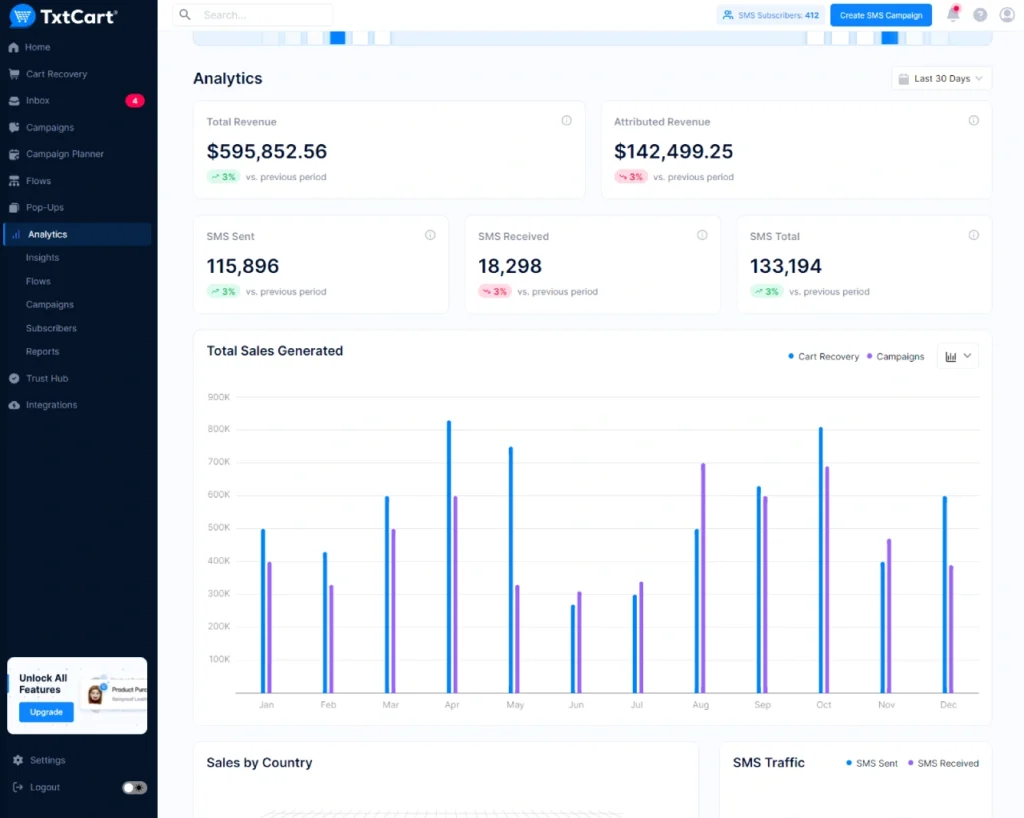
Key Analytics Features in TxtCart
1. Real-Time Campaign Performance Tracking
TxtCart’s analytics page gives you a snapshot of your campaign’s performance in real time. Track key metrics like Click-Through Rate (CTR), Revenue per Message, and Conversion Rate to understand how well your campaigns are performing and identify areas for improvement
2. Revenue Attribution by Campaign, Flow, and Popup
TxtCart allows you to attribute revenue directly to specific campaigns, flows, and popups, helping you understand the true impact of each component of your SMS strategy. This helps in refining your campaigns for maximum profitability.
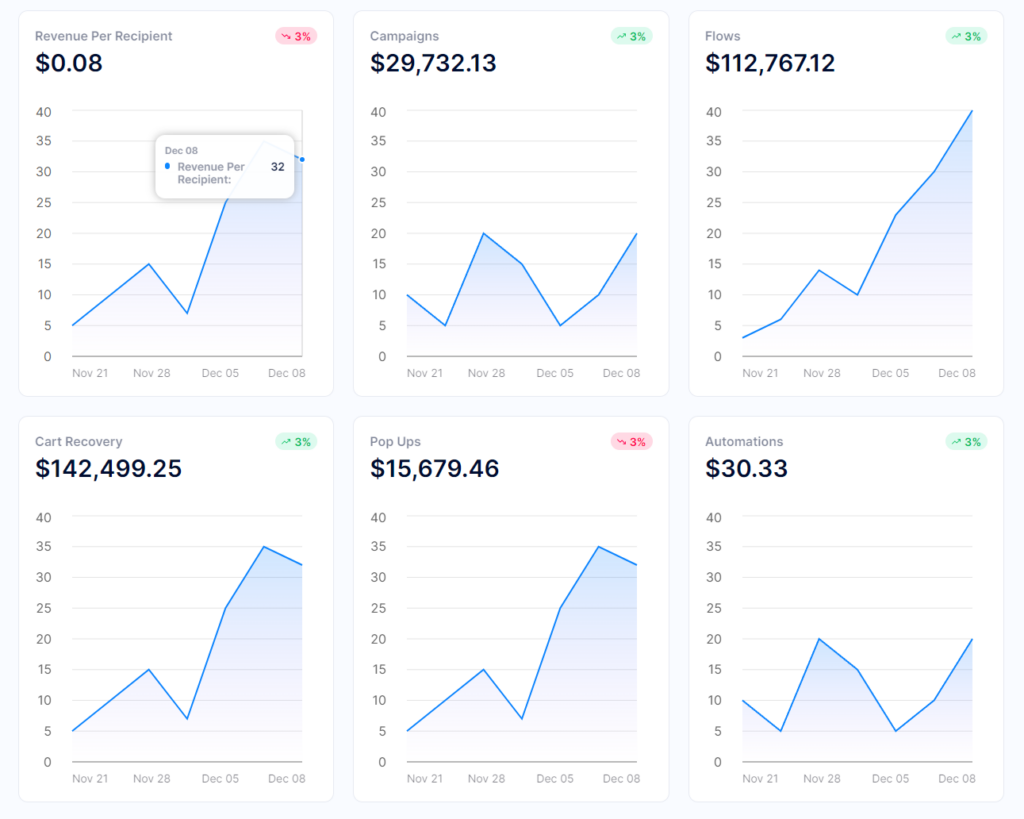
3. Subscriber Metrics
TxtCart provides detailed metrics on Subscriber Lifetime Value (LTV), New Subscribers, and Unsubscribers. A sudden spike in unsubscribes after a campaign might indicate message fatigue or poor targeting—prompting a strategy shift.
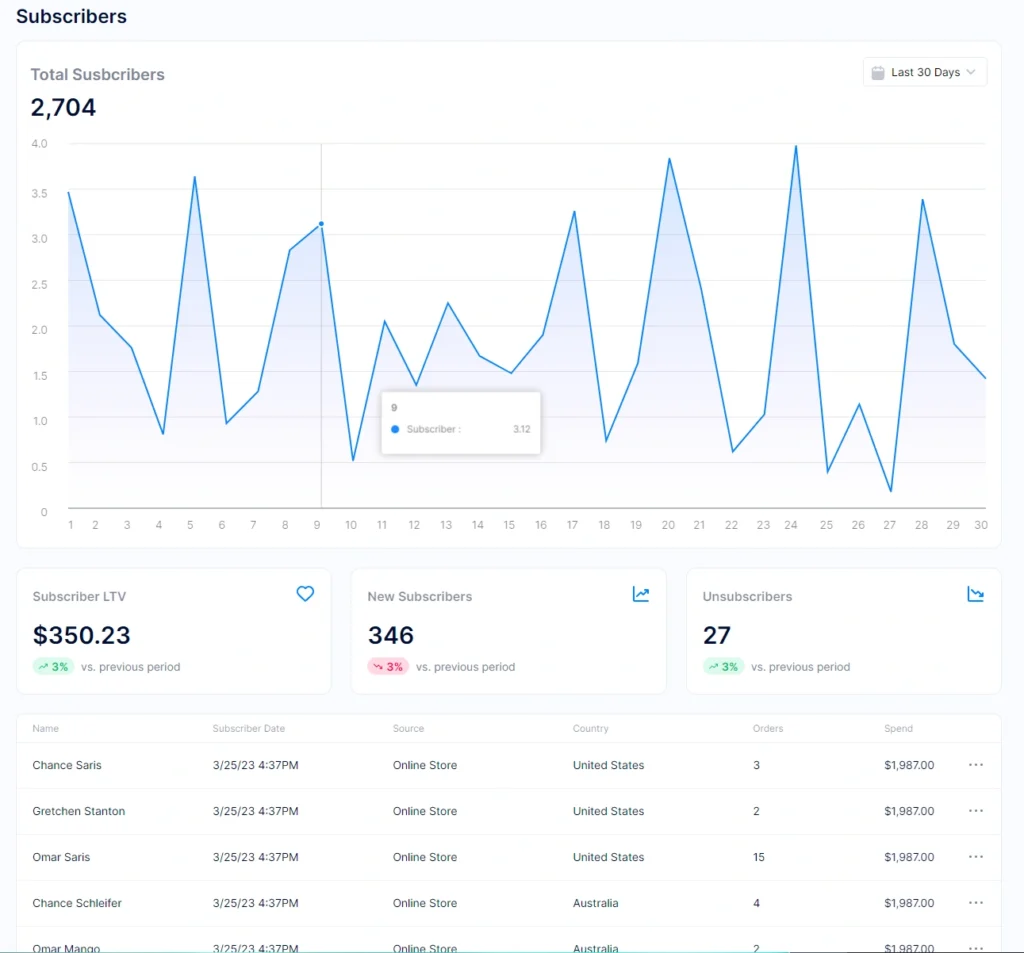
4. A/B Testing for Campaign Optimization
Use TxtCart’s A/B testing tools to experiment with different variations of your messages, timing, and offers. For example, if you send one group a 10% discount and another free shipping, you can determine which offer drives more conversions and use that insight for future campaigns.
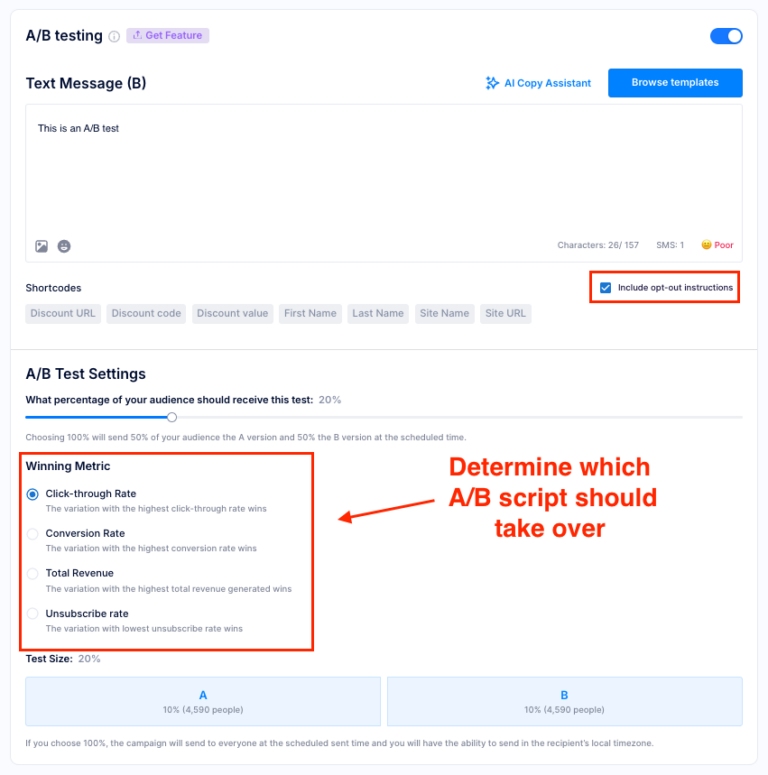
5. Customizable Reporting
TxtCart offers both pre-built and custom reports that allow you to track your SMS campaign performance from a macro and micro level. Whether you’re interested in revenue, subscriber growth, or campaign effectiveness, TxtCart generates reports tailored to your needs.
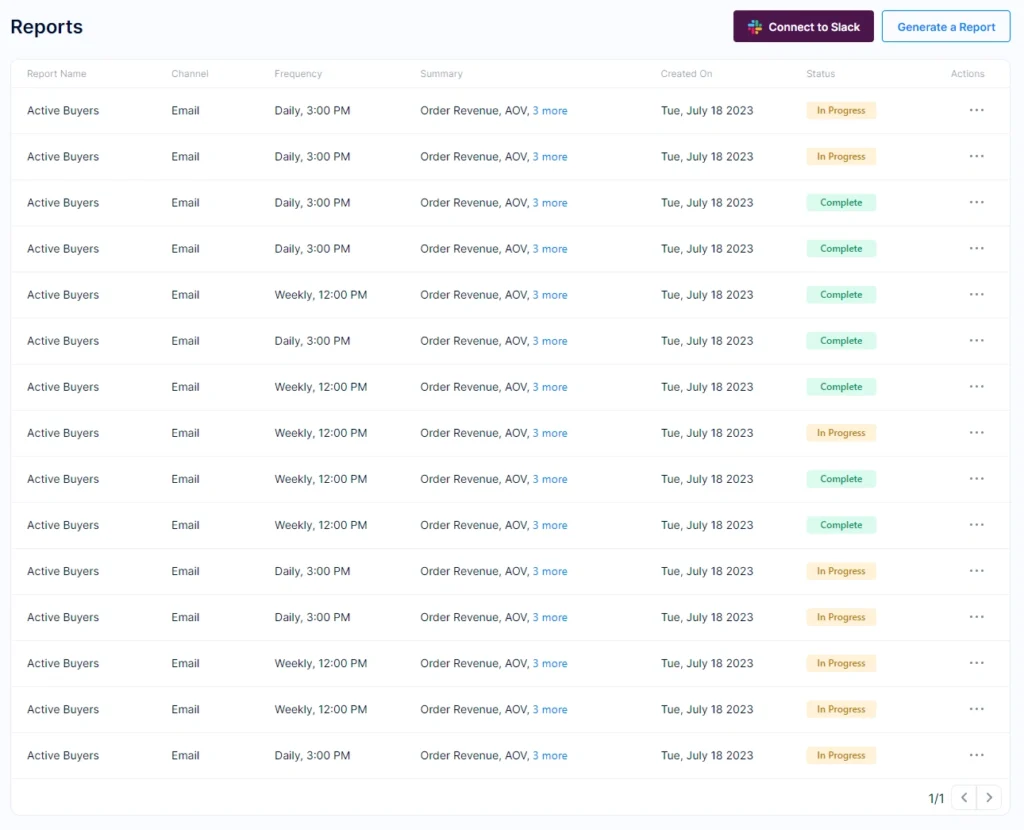
The Hidden Metric: Customer Sentiment Analysis in SMS Marketing
Most marketers track conversion rates, click-through rates, and ROI, but they miss a key factor—how customers actually feel about their messages. Customer sentiment analysis goes beyond numbers to reveal whether recipients view your SMS messages as helpful, annoying, or engaging.
Here’s how to measure sentiment in SMS marketing:
- Analyze customer replies: Use AI or NLP tools to categorize responses as positive, negative, or neutral.
- Track sentiment trends: Identify shifts in sentiment across different campaigns.
- Correlate with performance: Compare sentiment data with conversion rates to refine your messaging.
- Adjust messaging: Modify tone, frequency, and content based on customer reactions.
Customer sentiment isn’t the only hidden metric that can impact SMS performance. Another overlooked factor is timing efficiency, which measures the delay between a trigger event (like cart abandonment) and SMS delivery. Optimizing this timing ensures that messages reach customers when they are most likely to engage, increasing the chances of conversion.
Track the Right Metrics, Drive More Sales with TxtCart
Tracking the right SMS metrics is only half the battle—having the right tools makes all the difference. TxtCart helps optimize every aspect of your SMS marketing strategy, from real-time campaign and revenue analytics to AI-driven insights and high-converting automated campaigns.
Take the guesswork out of SMS marketing and start driving higher engagement, better retention, and increased revenue today.
Want to try conversational SMS for free?
- Try free for 14 days
- 10x ROI guaranteed
